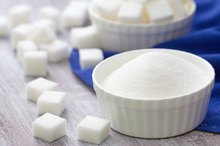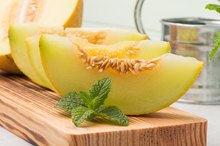Does Orange Juice Raise Blood Sugar Levels?
Orange juice contains natural sugar that will cause your blood sugar levels to rise after drinking it. Diabetics and people with hypoglycemia are often instructed to drink a glass of orange juice if blood sugar levels are low. Even though orange juice will raise blood sugar, it does not raise them as quickly as some other high-sugar foods and beverages.
Glycemic Index
The glycemic index is measurement of how much foods affect blood sugar. Foods with a glycemic index value less than 55 are considered low glycemic index foods, affecting the blood sugar less high-glycemic foods. Glycemic values between 55 and 70 indicate a medium effect on blood sugar. Foods over 70 have a high glycemic value, affecting blood sugar significantly and quickly. Orange juice has a glycemic value of about 50, as indicated by Harvard Health. This value indicates that orange juice is actually a low glycemic food.
- The glycemic index is measurement of how much foods affect blood sugar.
- Glycemic values between 55 and 70 indicate a medium effect on blood sugar.
Low Blood Sugar
Glycemic Load Food List
Learn More
Hypoglycemia, or low blood sugar, occurs when blood glucose values are less than 70 mg/dL, which can cause symptoms such as sweating, weakness, hunger and heart palpitations. When these occur, drinking a glass of orange juice boosts your blood sugar and relieves these feelings, although it may take 20 minutes or longer for your blood sugar levels to rise. Glucose tablets and other oral glucose products for diabetics raise blood sugar more quickly.
Types of Orange Juice
The sugar content of orange juice may differ between manufacturers due to the types of oranges used and whether it is made from concentrate. Some brands may include added sugar to sweeten otherwise tart juice. Other brands may use artificial sweeteners that do not affect blood sugar levels. Be sure to read product labels carefully. If orange juice has added sugar, add this fact into your decision about whether there are other, better choices for your health.
- The sugar content of orange juice may differ between manufacturers due to the types of oranges used and whether it is made from concentrate.
- Other brands may use artificial sweeteners that do not affect blood sugar levels.
Considerations
Foods Containing Glucose or Fructose
Learn More
When choosing orange juice, opt for juice with pulp, because 8 ounces of full-pulp juice provides at least 1/2 gram of healthy fiber. If you are diabetic, be sure to follow your doctor’s recommendations regarding diet and how to treat low blood sugar levels. Individuals who take insulin should be aware of how to treat conditions of low blood sugar in the event that too much insulin is given.
Related Articles
References
- NIH: When Your Blood Glucose Is Too High or Too Low
- Harvard Health: Glycemic Index
- Orange Juice. U.S. Department of Agriculture. Published April 1, 2019.
- Hyson DA. A review and critical analysis of the scientific literature related to 100% fruit juice and human health. Adv Nutr. 2015;6(1):37-51. doi:10.3945/an.114.005728
- Glycemic index for 60+ foods. Harvard Health Publishing. Updated March 14, 2018.
- Vitamin C Fact Sheet for Health Professionals. National Institutes of Health Office of Dietary Supplements. Updated July 9, 2019.
- Orange, raw. U.S. Department of Agriculture. Published April 1, 2019.
- Franke SI, Guecheva TN, Henriques JA, Prá D. Orange juice and cancer chemoprevention. Nutr Cancer. 2013;65(7):943-53. doi:10.1080/01635581.2013.817594
- Calcium Fact Sheet for Health Professionals. National Institutes of Health Office of Dietary Supplements. Updated October 16, 2019.
Writer Bio
Amber Canaan has a medical background as a registered nurse in labor and delivery and pediatric oncology. She began her writing career in 2005, focusing on pregnancy and health. Canaan has a degree in science from the Cabarrus College of Health Sciences and owns her own wellness consulting business.









